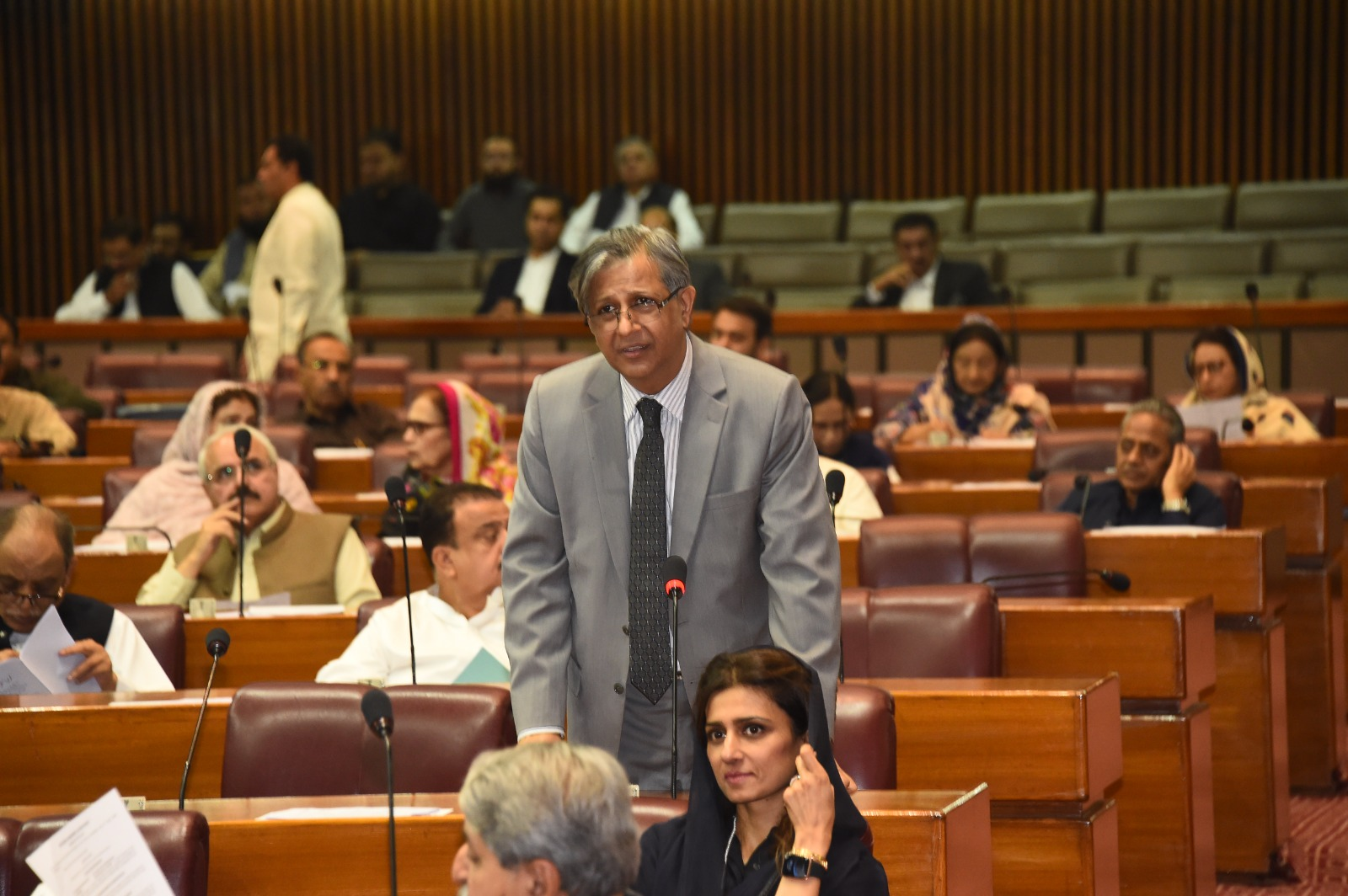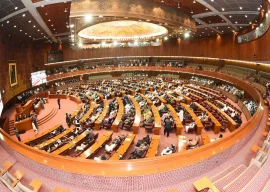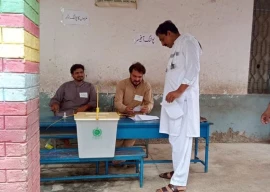
The government on Monday orchestrated another move in collaboration with the National Assembly to circumvent the Supreme Court’s order to the central bank for allocation of Rs21 billion funds for the elections in Punjab and Khyber-Pakhtunkhwa.
In order to protect the officers of the central bank and the Ministry of Finance from any possible contempt of court, the State Bank of Pakistan allocated Rs21 billion for holding the elections in two provinces. The Ministry of Finance presented a summary and a Money Bill in the federal cabinet for authorisation of the expenses.
The cabinet, in its turn, referred the matter to the National Assembly for a decision, which played the final stroke. The National Assembly rejected a motion that the government moved to grant Rs21 billion to the federal government to meet the expenditure, other than charged, during the financial year ending June 30, 2023 in respect of the Election Commission of Pakistan.
The lower house of parliament took the decision a day before the ECP, the SBP and the Ministry of Finance were supposed to submit a report in the Supreme Court to comply with its April 14 order to give funds for holding elections in Punjab and K-P.
The finance ministry had moved a summary for the consideration of the federal cabinet with a request to authorise the Rs21 billion spending and lay a bill “Other Sums for General Election (Provincial Assemblies of the Punjab and the Khyber-Pakhtunkhwa Act, 2023” bill in the National Assembly in this regard.
However, the discussions in the National Assembly Standing Committee on Finance revealed that the government did not have any intention to give the money to the ECP. It, early in the day, convened an emergency meeting of the committee that took up the issue of releasing the funds to the ECP.
The committee unanimously referred the matter to the National Assembly for a decision with a recommendation to reject the proposal.
Soon after the committee meeting, the finance ministry sent a summary to the federal cabinet for authorisation of the Rs21 billion funds and proposed the introduction of a new Money Bill in the National Assembly to approve the budget as “other expenditure” of Rs21 billion.
Read more: Election funds matter sent back to parliament
The cabinet decided that only the matter of authorisation of Rs21 billion will be taken to the National Assembly without the introduction of the Money Bill, a cabinet member told The Express Tribune.
Syed Naveed Qamar, the Federal Minister for Commerce, drew the committee’s attention towards the parliament’s resolution that barred the government from allocating the funds.
Parliament last week had given its decision through a resolution against allocating the funds and allocation of money will be contempt of parliament, said Naveed Qamar while objecting to the SC’s directions issued to the central bank.
“If the Supreme Court can send the people to jail for contempt of court, parliament can also exercise the same powers,” said the commerce minister.
“The federal cabinet has referred a summary by the finance ministry, based on recommendations made by the NA Standing Committee on Finance and Revenue on providing the election commission with funds for elections in Punjab and K-P, to parliament,” a handout issued by the Prime Minister’s Office said.
The statement of object of the proposed Money Bill sent to the cabinet stated that in order to comply with the orders of the Supreme Court and the constitutional scheme provided for authorization and release of funds for the purposes of general election, it is necessary to bring a Bill on the subject matter.
Also read: NA Speaker says Parliament has authority to reject SC decision
However, subsequently, the law minister moved a motion in the National Assembly, on behalf of the Finance Minister who is currently in Saudi Arabia, to adopt the report of the standing committee on Finance.
The committee members also warned the officials of the SBP and the Finance Ministry that if the funds were issued, they may have to pay out of their pockets.
The Supreme Court’s order was not in line with the Constitution and the law, therefore, we have brought the issue before parliament, said Azam Nazeer Tarar, the Federal Minister for Law, during the meeting of the standing committee.
The ultimate purse power rests with the National Assembly. If the federal government authorises the Rs21 billion expenditures but the National Assembly does not approve it before June 30, then there will be a hole in the budget, said Attorney General for Pakistan Mansoor Awan.
“The SBP has allocated funds into the ECP account but the money has not been transferred,” Seema Kamil, the acting governor SBP, informed the standing committee on Finance.
On April 14, the Supreme Court had instructed the central bank to directly transfer Rs21 billion to the ECP and intimate the Finance Ministry for issuing authorization to the Accountant General of Pakistan Revenue for utilization of the funds.
If the SBP gave money, we would hold it accountable, said MNA Syed Musa Gilani of the PPP. The law minister said that the Constitution clearly defines a mechanism for authorization of the expenditures but the SC’s Order has exposed the officers to adverse actions.
Will the officers pay the Rs21 billion from its pocket, if the National Assembly refused to give ex-post facto approval of the expenditure in June, questioned the Law Minister. He said that in this context it is appropriate that parliament should take a decision now instead of giving ex-post facto approval later on.
The principle of tracheotomy of power should be respected and it is wrong to re-write the Constitution through judgments, said Qamar.
The committee chairman, Qaiser Sheikh, said that the approval of the supplementary grants should be discouraged as it is tantamount to usurping the power of parliament.
Under Article 84 of the Constitution, in case of excess expenditure or to meet the unforeseen fiscal requirements, the federal government has the authority to approve supplementary grants that are subsequently vetted by the National Assembly at the end of the fiscal year.
Instead of issuing directions to the SBP, the Supreme Court should amend Article 84 and replace the word federal government with the Supreme Court, said MNA Barjees Tahir of the PML-N.
“It is not in the national interest to make duplicate expenses by separately holding the National Assembly and provincial assemblies elections,” said the law minister.
He opined that the expenditures on the conduct of elections do not fall in the category of the charged expenses – a term coined for expenses by various state organs that are compulsory in nature and the National Assembly does not have a right to vote.
Tarar said that parliament has already rejected a bill to treat expenses on the elections as charged expense. “The SC has agreed that expenses on elections are not charged and may be treated as other expenditure,” claimed the law minister.




1732003896-0/Zendaya-(1)1732003896-0-165x106.webp)
1732011525-0/Express-Tribune-(8)1732011525-0-270x192.webp)
1732004108-0/Express-Tribune-(5)1732004108-0-270x192.webp)

1732000275-0/Untitled-design-(9)1732000275-0-270x192.webp)











COMMENTS (1)
Comments are moderated and generally will be posted if they are on-topic and not abusive.
For more information, please see our Comments FAQ